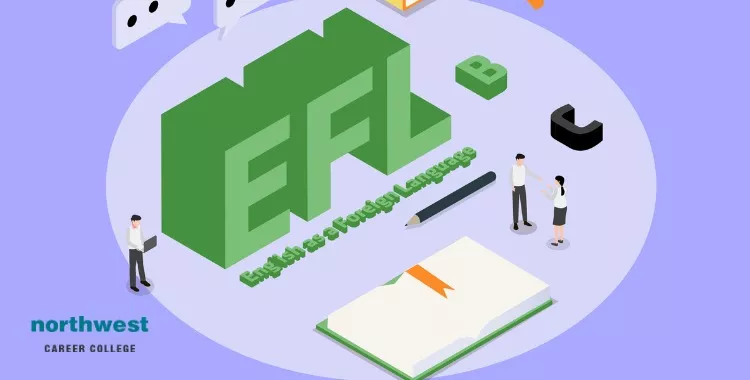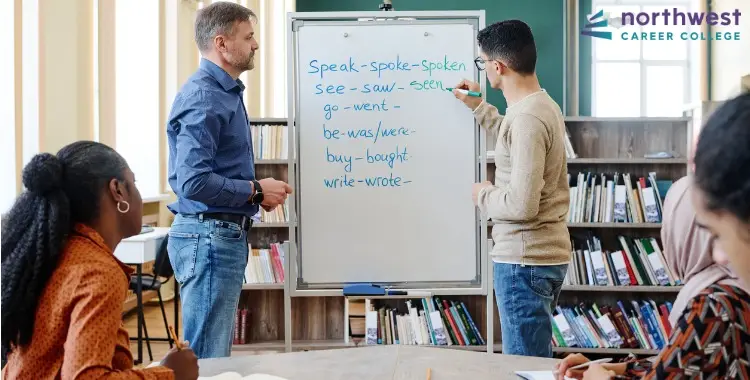What Is The Difference Between ESL And EFL?
- ESL Courses
- February 25, 2025
- 11.2k views
- 5 min read

ESL and EFL are terms that are often used interchangeably, but they actually refer to two different types of English language learning. ESL (English as a Second Language) refers to learners who are using English in order to communicate in a second language.
On the other hand, EFL (English as a Foreign Language) learners are those who are studying English in a non-native country.
Both types of learners face different challenges, but there is one common goal: to be able to use English proficiently for communication. So what is the difference between ESL and EFL? Let’s take a closer look.
Table of Contents
- ESL stands for English as a Second Language, while EFL stands for English as a Foreign Language
- The main difference between the two is that ESL learners are learning English in order to be able to communicate in an English-speaking country, while EFL learners are learning English for other reasons such as academic study or personal interest
- There are different approaches to teaching each type of learner – ESL learners will often need more help with grammar and pronunciation, while EFL learners may need more help with understanding cultural references
- Ultimately, the goal of both types of instruction is to help the learner become proficient in English
- Learn English as a second language today
- Experienced, Efficient, and free for students
ESL stands for English as a Second Language, while EFL stands for English as a Foreign Language
ESL and EFL are both terms that are important to understand in a world where English proficiency has become increasingly relevant across cultures. ESL, which stands for English as a Second Language, is when an individual’s native language is not English.
This may have been the case since birth or due to lifestyle changes that have caused them to move away from their home country of origin, requiring them to learn English in order to participate in society fully. In contrast, EFL, or English as a Foreign Language, is when someone learns English from outside their home country due to personal interests or studying abroad.
Regardless of why someone decides to study the language, increasing one’s English proficiency can result in numerous opportunities and experiences that were not previously attainable.
The main difference between the two is that ESL learners are learning English in order to be able to communicate in an English-speaking country, while EFL learners are learning English for other reasons such as academic study or personal interest
ESL and EFL both involve the study of English, but ESL (English as a Second Language) and EFL (English as a Foreign Language) present slightly different contexts.
Learners of ESL typically live in an English-speaking environment and are learning the language in order to be able to communicate within it. On the other hand, EFL learners are immersed in a non-English-speaking context and are typically motivated by academic or personal reasons to gain fluency in the language, such as wanting to attend university or read literature in its original language form.
Ultimately, no matter their context, each student’s individual goals must always be kept in mind when deciding how best to approach their learning process.
There are different approaches to teaching each type of learner – ESL learners will often need more help with grammar and pronunciation, while EFL learners may need more help with understanding cultural references
Teaching ESL and EFL students requires different approaches in order to address their individual needs effectively. ESL students tend to be more focused on grammar and pronunciation in order to communicate properly; learning the rules of the language is key for them.
Conversely, EFL learners need additional instruction in comprehending the cultural references that a language can bring with it; this reduces misunderstanding and allows them a chance to learn more about varying cultures.
By understanding the learning needs of both types of students, teachers are better equipped to guide their lessons and help their learners reach fluency within their chosen language.
Ultimately, the goal of both types of instruction is to help the learner become proficient in English
Learning a foreign language can be an exciting yet challenging process, especially for English language learners. There are typically two types of instruction used to help them become proficient: traditional and communicative.
Traditional instruction may use textbooks and rigid structures in order to teach grammar, vocabulary, and other aspects of the language, while communicative instruction focuses on conversational fluency. Regardless of which instructional approach is used, the common goal of both is to ultimately ensure the student has the necessary skills to communicate confidently in English.
This end result can often be achieved by blending both approaches together in order to find a balance that best suits each individual learner’s needs.
Learn English as a second language today
ESL and EFL are both acronyms for instruction in the English language, but they refer to very different types of learners. ESL stands for English as a Second Language, while EFL stands for English as a Foreign Language.
The main difference between the two is that ESL learners are learning English in order to be able to communicate in an English-speaking country, while EFL learners are learning English for other reasons such as academic study or personal interest.
There are different approaches to teaching each type of learner – ESL learners will often need more help with grammar and pronunciation, while EFL learners may need more help with understanding cultural references.
Ultimately, the goal of both types of instruction is to help the learner become proficient in English. If you’re interested in our ESL program here at Northwest Career College, contact us today to talk to one of our admissions counselors.
Experienced, Efficient, and free for students
The benefits of taking an ESL course are clear. By improving your English skills, you gain better access to education, greater earning potential, a better social life, and even better results from healthcare.
We here at our trade school are committed to enhancing our students’ lives, which is why we are proud to offer our ESL courses free of charge to our students and to extend that offer to their families.
Our seasoned language teachers are experienced in working with international students from all over the world and are there to help you get the most from your classes.
To help your lessons fit in with your work and home life, we also offer day and weekend classes. If you are interested in taking advantage of this excellent opportunity, then call one of our ESL councilors today on (702) 403-1592.




